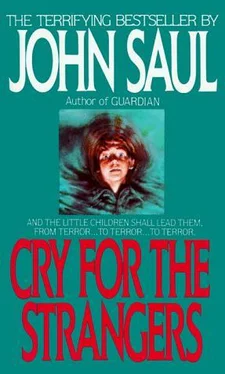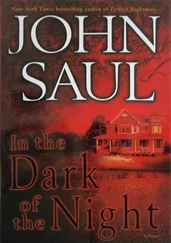When he had walked nearly a hundred yards and felt the cabin should be dearly visible, he stopped and stared into the darkness, as if by concentrating hard enough he could force the dim light of the kerosene lanterns to appear in front of him. But still there was only blackness, and his concern turned to fear.
He began to run, no longer watching his steps, but straining his eyes to find the cabin, the cabin where Rebecca and the children would be waiting for him.
He tripped, sprawling headlong into the sand, his right hand only partially breaking his fall, his left hand, suddenly entangled in his pocket, useless.
He tasted brackish salt water in his mouth and felt the abrasive scraping of sand on his face. As he thrashed around, wiping his mouth on his sleeve and trying to get his left hand free, his foot hit something.
Something soft.
He felt the numbness begin in his mind — the same numbness that had fallen over him last night. He moved slowly, almost reluctantly.
He touched Rebecca gently, caressing her face. Even though she was still warm, he knew she was dead.
Her head, cradled in the sand, lay at the same unnatural angle as had Jeff Horton’s the night before.
It was as if his mind refused to accept it at first. Glen crouched beside her, rocking slowly back and forth, no longer feeling the wind, the rain funneling unheeded down his collar.
“Rebecca,” he said softly. Then he repeated her name. “Rebecca.”
The pain hit him, washing over him with all the unexpected intensity of a tidal wave, and he threw himself onto her, wrapping her in his arms, sobbing on her breast.
“Rebecca,” he moaned. “Oh, God, Rebecca, don’t leave me.”
She lay limply in his arms, her head rolling gently from side to side, her unseeing eyes staring up into the night sky.
Glen’s pain changed from the wracking misery of the moment of discovery into a dull ache, an ache he was sure he would bear for the rest of his life.
Why had Rebecca been on the beach at all?
He thought of the children.
Where were the children?
He should look for them. They must have left the cabin, and Rebecca must have gone to look for them; she would never have left them alone, not Rebecca.
He stood up and looked uncertainly toward the forest, a black shadow set deep in the darkness of the night. If they were out here they would be in the woods.
But he couldn’t leave Rebecca, couldn’t leave her lying cold in the rain and the wind, the surf lapping at her feet. Before he went looking for his children he would have to attend to his wife.
He picked her up and began carrying her toward the cabin, his fogged mind wondering with each step at his need to care for the dead before tending to the living.
Where Rebecca had lain, there was now nothing but sand — and the darkly glistening form of a blue glass fisherman’s float.
When he got to the cabin he paused, something preventing him from going inside. At first he wasn’t sure what it was, but after a moment he knew.
The cabin wasn’t empty.
There was nothing about it that told him it was occupied, only an intangible feeling. Though there was no sound, he was sure his children were there.
He laid Rebecca’s body gently on the porch, then opened the door.
“Robby? Missy? It’s Daddy.”
He heard a scrambling sound, and then the children threw themselves on him.
“Daddy, Daddy,” Missy sobbed. “Something awful happened.”
Glen sank to his knees and drew the children close. “I’m sorry, Daddy, I’m sorry,” Robby kept repeating, over and over.
“There’s nothing for you to be sorry about,” Glen told his son. “Nothing that happened is your fault. Nothing at all.”
“But I went out,” Robby insisted. “I wanted to go outside, so I did. And Mommy and Missy came to look for me, and then — then—” he choked on his words and began sobbing helplessly.
“We were on the beach,” Missy said. “Something grabbed Mommy, and Mommy told me to run, and I did, and — and—”
“Hush,” Glen whispered. “You don’t have to tell me about it now. I have to take care of Mommy, and I want you to do something for me.”
He disentangled himself from the children and lit the small lantern that should have been lighting Rebecca’s work as she waited for him to come home, but instead had remained cold and dark as night fell over the beach. As the flame flickered to life the room seemed to warm slightly, and Robby and Missy began to calm down.
“Robby, I want you to take Missy into your bedroom. Put some clean clothes in a bag. For both of you. Can you do that?”
Robby nodded gravely.
“All right. Then wait for me. In the bedroom. Don’t come out until I come for you, all right?”
“Are you going somewhere?” Missy asked, her eyes wide and her mouth quivering.
“No, darling, of course not. I’ll be right here.”
Missy started to ask another question, but Robby grabbed her hand and began pulling her toward their tiny bedroom. “Come on,” he said.
“Stop pulling,” Missy cried. “Daddy, make him stop.”
“Don’t pull her, Robby,” Glen said. “And you stay in there with your brother,” he instructed Missy.
As soon as the door separating their room from the main part of the cabin was closed, Glen opened the sofa bed he and Rebecca had shared and pulled one of the blankets off it. Then he carefully reclosed the bed and went back to the front porch.
He moved Rebecca to the end of the porch farthest from the door and carefully wrapped her in the blanket. When he was finished he went back to the front door, then turned to survey his work. If he got the children across the porch fast enough, they wouldn’t notice that something was lying there only a few feet away. Struggling to maintain his self-control, Glen went back into the cabin.
Robby and Missy were sitting quietly on the edge of the lower bunk, their faces serious, their hands folded in their laps. Between them was a brown bag stuffed with clothing.
“Mommy’s dead, isn’t she?” Robby asked.
“Yes, she is,” Glen said steadily.
“Why?” It was Missy, and her face looked more curious than anything else. Glen realized for the first time that Rebecca’s death had no meaning for them yet. While it was painful beyond bearing for him, for his children it was still an abstract event.
“I don’t know,” he said gently. “Sometimes things like this happen.”
“Do we have to go away?” Robby asked.
“Go away?”
“Is that why I put our clothes in the bag? Because we have to go away?”
“I’m going to take you down to stay with Brad and Elaine tonight,” Glen said. “I’ll stay there too, but I have to do some things tonight and I don’t want to leave you alone.”
“Are we going now?” Missy asked.
“Right now,” Glen replied, forcing himself to smile. “Now it’s pouring rain outside, so I want you two to see who can get to the car first, all right?”
The two children nodded eagerly.
“I’ll open the door, and you two race. The first one to the car gets a surprise.”
“What is it?” Robby demanded.
“If I told you it wouldn’t be a surprise anymore, would it?”
He led them into the other room and made them stay back from the door while he opened it. Tears were streaming down his face.
“On your mark. Get set. Go!” he cried, and the children, intent only on the race, streaked through the door and across the porch, vying to be the first to reach the ancient VW van. Glen picked up their bag of clothing, closed the door, and followed them.
“Oh, Jesus,” Brad Randall moaned as he opened the door for Glen Palmer and the children. The look in Glen’s eyes and the tear-streaked faces of the children told him something terrible had happened. He could guess what.
Читать дальше












